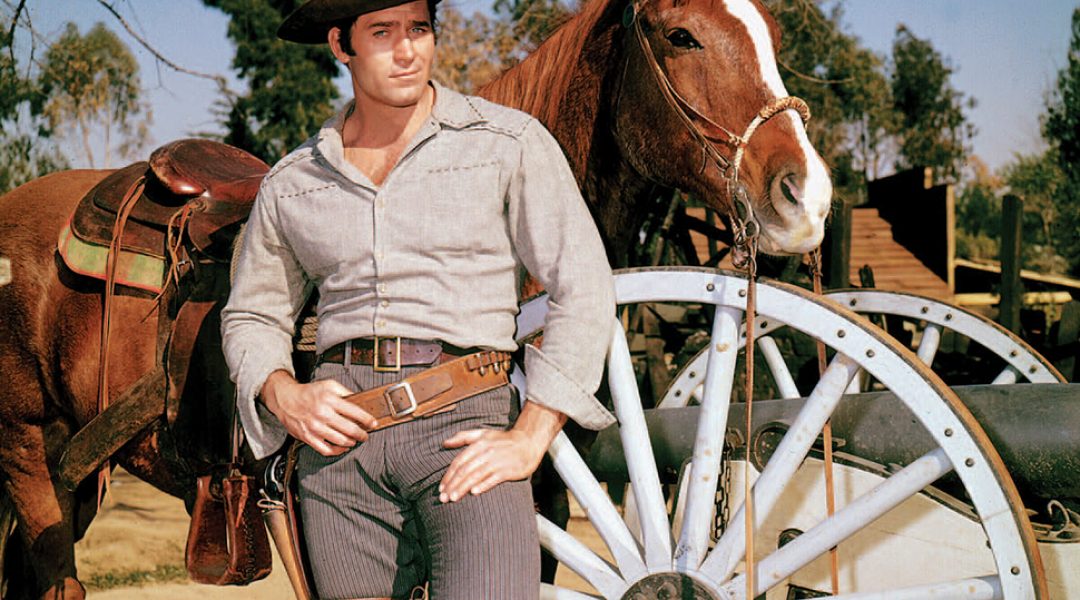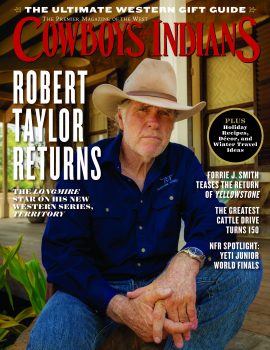The late Cheyenne star appeared opposite such notables as Roger Moore, Burt Reynolds and Margot Kidder.
During and after the prime-time run of his classic Cheyenne TV series, Clint Walker — whose birthday we celebrate May 30 — made memorable impressions in a wide variety of theatrical and made-for-television movies, ranging from wartime dramas (The Dirty Dozen, None But the Brave) to scary thrillers (Killdozer, Scream of the Wolf). Fittingly enough, however, he remains best known – and most admired – for his westerns. Here are ten of his finest, all widely available for rental or purchase on various platforms.
FORT DOBBS (1958)
Hoping to capitalize on their Cheyenne star’s popularity with TV viewers, Warner Bros. showcased Walker in his very first star vehicle, a well-crafted sagebrush saga directed by veteran filmmaker Gordon Douglas (Only the Valiant, Them!). Walker plays Gar Davis, a fugitive on the run through Indian Territory who interrupts his flight from justice to escort Celia (Virginia Mayo), a lovely homesteader, and Chad (Richard Eyer), her young son, out of harm’s way and off to a nearby cavalry outpost. Unfortunately, Celia comes to suspect that Gar killed her missing husband. Even more unfortunately, Clett (scene-stealing Brian Keith), a grizzly gunrunner who’s Gar’s long-time frenemy, develops a hankering for Celia as he tags along for the ride. Western buffs should appreciate the satisfyingly upbeat ending, which strikes echoes of the original 1931 Stagecoach.
YELLOWSTONE KELLY (1959)
Originally conceived as a project for John Wayne and director John Ford, this Burt Kennedy-scripted western reteamed Walker and director Gordon Douglas for a fanciful drama based loosely – very loosely, actually -- on the real-life exploits of hunter-adventurer Luther “Yellowstone” Kelly. In this version of the mythos, Kelly (Walker) is a reclusive trapper who just wants to be left alone to forage for quarry on Sioux land. But a bothersome young buck named Harper (Edward Byrnes) insists on becoming his apprentice. And a beautiful Arapaho woman named Wahleeah (Andrea Martin) captures his heart – greatly complicating Kelly’s relationship with a Sioux chief (John Russell of TV’s Lawman) who wants her for his own. At the time of the movie’s release, co-star Byrnes was enormously popular as hip valet parking attendant “Kookie” Kookson in the Warner Bros. TV series 77 Sunset Strip. Thus, the advertising tagline read: “Clint’s back! And ‘Kookie’ is with him!”
GOLD OF THE SEVEN SAINTS (1961)
Long before he was James Bond – and not so long before he filled in for James Garner on the Warner Bros. series Maverick – Roger Moore rode tall, shot straight and cracked wise (with an Irish brogue) alongside Walker in an entertaining tale about two fur trappers turned prospectors who attract trouble after they strike gold. “We got along great,” Walker recalls. “I wish we would have made another picture together. But here’s a funny thing: Roger was very afraid of heights. And I used to kid him about it. One time, we were working in Utah, on this big sandstone ledge overlooking the Green River. It was only about 15 feet wide, but I was used to heights – I’d been a steeplejack in my time – and it just didn’t bother me. So I used to walk close to the edge – and every time I did, poor Roger would just about turn green.”
THE NIGHT OF THE GRIZZLY (1966)
One of Walker’s personal all-time favorites – when I visited him three years ago, I noticed he kept a framed poster for it hanging in a place of honor near his home office – and arguably the most popular of his films. Director Joseph Pevney’s period drama skillfully and effectively mixes elements of settler-versus-land-grabber westerns and nature-gone-wild horror flicks. When former lawman Jim Cole (Walker), his wife Angela (Martha Hyer) and their two children arrive in a small Wyoming town to claim a ranch bequeathed by Jim’s late uncle, they find themselves not-so-gently prodded to sell their land by local big-shot Jed Curry (Keenan Wynn). But Curry is little more than a mild annoyance compared to another threat – a legendarily fierce grizzly bear that periodically terrorizes the territory. How fierce are we talking about? Well, consider this: His bloody rampages have earned him the name Satan.
THE GREAT BANK ROBBERY (1969)
Walker proves to be a great sport when it comes to kidding his image as a larger-than-life straight-arrow hero in this wildly uneven but occasionally hilarious western spoof directed by Hy Averback (I Love You, Alice B. Toklas) and scripted by William Peter Blatty (who later gained fame and fortune as author of The Exorcist). While a fake preacher (Zero Mostel) and his sexy assistant (Kim Novak) plot to burrow into a seemingly impregnable small-town Texas bank, stalwart Texas Ranger Ben Quick (Walker) goes undercover as a laundry operator to help a Secret Service agent (Mako) and his comrades with their own plot to enter the bank vault. (Don’t misunderstand: Quick and company are good guys, seeking incriminating evidence against a banker who is laundering outlaw money.) Claude Akins is a pip as a self-dramatizing bad guy who sees himself as more victim than victimizer, even when he fatally shoots his partner in crime for a perceived insult. (“Why,” he wails, “do I always kill the people I love?”) But Walker is the one who gets the movie’s funniest line, when he’s asked by Novak’s character if he enjoyed their smooch. Not surprisingly, his answer is affirmative: “Just ‘cause I talk slow don’t mean I’m peculiar.”
SAM WHISKEY (1969)
Veteran TV and movie western director Arnold Laven (Rough Night in Jericho, The Glory Guys) cast Walker as a kinda-sorta absent-minded professor in this seriocomic caper. After succumbing to the, ahem, blandishments of a sexy widow (Angie Dickinson), roguish adventurer Sam Whiskey (Burt Reynolds) agrees to help preserve her late husband’s family name by recovering a cache of gold bullion the guy stole from the Denver Mint – and then breaking into the mint vault to replace the booty. Reynolds, on the cusp of movie superstardom, is the main attraction here, doing the smiley, smart-alecky shtick that would serve him even better in a string of 1970s hits. But Ossie Davis also has his moments as a crafty blacksmith allied with Whiskey, and Walker is amusing as O.W. Bandy, a self-described “inventor and businessman” who periodically quotes Plato quoting Socrates while assisting in the gold transfer. At one point, he’s called upon to impersonate a jealous husband so his confederates can trap a mint inspector. Bandy has just one line to deliver – “Aha! I caught you trifling with my wife!” – and he is his own worst critic: “I guess I didn’t do it too slick, huh?”
MORE DEAD THAN ALIVE (1969)
After serving 18 years in prison, the aptly named “Killer” Cain dearly longs to settle down as a rancher and never touch a gun again. Unfortunately, given his resume, Cain finds employment opportunities are scarce, and must settle for work as the star attraction in a traveling sideshow operated by the grandiloquent Ruffalo (Vincent Price). Bad things happen while Cain is sought out by gunfighters eager to settle old scores and/or enhance their reputation. But something even worse occurs during a downbeat finale that is truly shocking in its brutality. Walker looked back on working with Vincent Price as a career highlight. “You’ll never meet a finer gentleman or a more professional actor,” he said of his late, great co-star. “He did a wonderful, wonderful job on that part, and I just felt so honored to be able to work with him.”
YUMA (1971)
As big-screen westerns began their slow fade from the multiplexes during the 1970s, Walker returned to television in a series of sturdily made and well-received TV-movies. Directed by Ted Post (Hang ‘Em High), Yuma actually was intended as a pilot for a western series, with Walker perfectly cast as Dave Harmon, a former U.S. Army officer turned U.S. Marshal who pursues a personal agenda while working as a lawman in towns near army forts. He offers a strong yet understated performance as Harmon lays down the law in the lawless town of Yuma, occasionally running up against drunken cowboys, crooked cattle dealers, increasingly unhappy Indians – who aren’t getting nearly the number of cattle they’ve been promised in a treaty – and a powerful rancher (Morgan Woodward) who’s encouraged to think the worst of Harmon. One can’t help wishing the TV-movie actually had spawned a weekly drama, if only to enjoy more edgy confrontations between Walker and Peter Mark Richman, who presumably would have been a series regular as fort commander Major Luca. “If he’s guilty,” the major says of a soldier suspected of murder, “he’ll face a court martial.” Harmon begs to differ: “If he’s guilty, he’ll face me.”
HARDCASE (1972)
When Jack Rutherford (Walker) is declared missing in action during the Spanish-American War, his presumptive widow Rozaline (Stephanie Powers) sells their Texas ranch and runs off with Mexican revolutionary Simon Fuegas (Pedro Armendarez Jr.). But Rutherford turns out to be very much alive, and seriously upset about what transpired during his absence. He journeys down to Mexico and kidnaps Fuegas, figuring that, if he can’t get his wife back, he can at least use ransom money to regain his ranch. Director John Llewellyn Moxey (The Night Stalker) generates a fair amount of suspense as the two men take the long trek back to Texas, accompanied by an emotionally torn Rozaline and a mercenary (Alex Karras) of dubious loyalty. Better still, Walker registers convincingly in an emotionally complex performance.
THE BOUNTY MAN (1972)
Demonstrating his seldom tapped potential for brusque badassery, Walker sports a dark mustache and a surly attitude as Kincaid, a notorious bounty hunter who doesn’t really care whether he takes ‘em dead or alive. “OK,” he tells two fugitives in the opening scene, “what’s it going to be? In the saddle, or across it?” (Just in case we miss the point, the opening theme informs us: “Some may buy, some may sell – but they all go to hell with The Bounty Man.”) But Kinkaid’s hard heart incrementally softens as he interacts with the naive girlfriend (Margot Kidder) of smooth-talking outlaw Billy Riddle (Jon Ericson) while they travel through rough country. There are some slight but noticeable plot similarities to Hardcase (also directed by John Llewellyn Moxey) and a finale that plays like a recycling of the last scene in Anthony Mann’s The Naked Spur. Even so, The Bounty Man stands on its own merits as a gritty western drama, significantly enhanced by the supporting performance of Richard Basehart as a rival bounty hunter who waxes eloquent about “women in perfumed dresses” and other treats in store for anyone who claims the reward on Riddle’s head.












